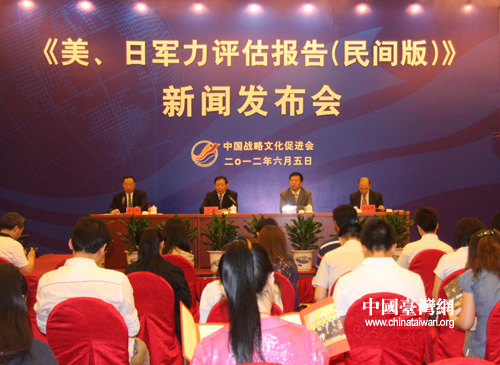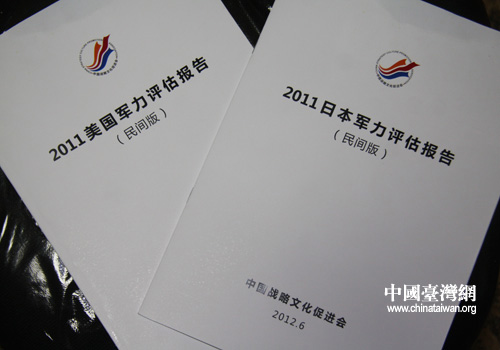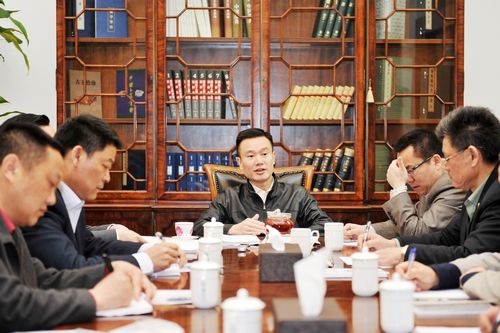Luo Yuan’s US-style military report, and difficulties for Dai Xu
Posted: July 20, 2013 Filed under: PLA & PLAN, Weibo | Tags: China Strategy Culture Promotion Association, Chinese army propaganda, 罗援, 罗援少将, Dai Xu, external propaganda, 龙韬, Long Tao, Luo Yuan, PLA, PLA political work, propaganda, Taiwan Affairs Office, Weibo, 戴旭, 中国战略文化促进会 1 Comment
Press conference launching China Strategy Culture Promotion Association’s 中国战略文化促进会 2011 reports on US and Japanese military developments
Here is an actual weblog post — a log of what one reads on the internet — rather than the usual rambling speculative essay.
Luo Yuan’s think tank, the “China Strategy Culture Promotion Association” (中国战略文化促进会), yesterday released separate reports on the “military power of the US and Japan”.
Curiously, given it’s supposedly an non-governmental think tank (民间智库), the Global Times quoted China Foreign Affairs University’s Su Hao calling the reports “strong and timely responses to the inaccurate remarks in the US annual report on China’s military and the Japanese Ministry of Defense’s recent white paper” (emphasis added).
The report has been given lots of coverage in the Chinese-language media. Chinese radio bulletins yesterday were reporting on the report before it was even released.
The radio also mentioned that this year’s reports will be issued in English. I hope this is true, because it looks to be packed with highlights:
The reports pointed out that neither the US nor Japan had enough transparency regarding their military budgets.
[…]
The report concluded that Japan has strengthened its defense in its southwest islands and was preparing to take over the Diaoyu Islands by force in the future and intervening in any potential conflict in the Taiwan Straits.
Luo Yuan himself was quoted:
“We need to prepare for the worst [situation],” Luo said, adding that China should be well equipped.
This is the second year the think tank has released these reports. Copies of last year’s report carried the term “public version 民间版” on the cover, as pictured at the top, which seems to suggest there also exists some kind of restricted-circulation government version. If so, the China Strategy Culture Promotion Association looks like a good analogue of Luo Yuan’s own roles, at the intersection of military intelligence gathering, public diplomacy, propaganda work, and Taiwan affairs.
Note the watermark on the above pictures, which are taken from the think tank’s own website here. Chinataiwan.org is a website of the PRC State Council Taiwan Affairs Office, which Luo Yuan’s father Luo Qingchang directed in the 1970s and early 1980s.
* * *
I stumbled across a couple of rather astonishing little Dai Xu tidbits a couple of weeks back.
1.) According to China Intellectual Property News, Dai Xu sued a Hong Kong magazine Wide Angle Lens《广角镜》 and others including a Beijing airport newsagent, for lifting 52% of the 2011 Long Tao article calling for a South China Sea war. He demanded withdrawal of the magazine from circulation, apologies, compensation of ¥200,000. Judgement was handed down in January this year. He was awarded……wait for it…….¥240.
Among other things, i guess this shows Colonel Dai is not that well-connected.
2.) A sharp-witted blogger has outed Dai Xu for writing a preface, under his penname “Long Tao”, to his own chapters, in a book edited by him. Of one Dai Xu chapter, “Long Tao” asserts that “this piece can be called the modern-day Strategies of the Warring States 《战国策》” and that “Dai Xu has continued his consistent style of speaking the truth . . . on national strategy, Dai Xu’s viewpoint is deafeningly clear, and manifestly superior”. In the other self-preface, Long Tao says the following article “will receive the support of the majority of Chinese people and Chinese military personnel . . . an incomparably correct position . . . nobody has ever explained important theoretical problems so clearly, correctly, reasonably and vividly”.
Here we see essentially the same self-wumao tactic as Luo Yuan got caught employing on weibo a few months back. A post appeared on Luo’s weibo account, praising Luo Yuan’s superb analysis of the North Korean problem, and declaring him “the most popular military commentator on television”.
The Major General claimed he claimed his account had been hacked, but Kai-fu Lee certainly wasn’t buying it. He did, however, offer Luo some expert advice: “Although you can use different browsers to operate multiple weibo accounts, the premise is that each browser must be logged into a different account!”
The enigma of CEFC’s Chairman Ye
Posted: June 7, 2013 Filed under: PLA & PLAN | Tags: CAIFC, CEFC, Chairman Ye, China CEFC Energy Company, Chinese military, Daiwah, enemy work, external propaganda, General Political Department Liaison Department, Huaxin, Kissinger, liaison work, Long Tao, Nishan Forum, PLA General Political Department, Xing Yunming, Ye Fei, Ye Jianming, Ye Xuanning, Zhenrong, 华信能源有限公司, 叶简明, 叶选宁, 叶主席 16 CommentsUPDATE JANUARY 2017: Lots more information about Chairman Ye has come to light, including confirmation that he is not Ye Jianying’s grandson (but he is in business with Marshal Ye’s granddaughter). Read the latest update here first.
UPDATE APRIL 2016: The following odyssey through the business and ideological world of CEFC, an apparent platform of the Liaison Department of the PLA General Political Department (GPD-LD), was co-written with John Garnaut. Based on new information received, I now believe it’s unlikely that Chairman Ye Jianming is a grandson of Marshal Ye Jianying. Interestingly, there may be a connection with Marshal Ye’s family by marriage, which could be confirmed in coming months or years. The evidence of the young Chairman’s connection with the GPD-LD, however, remains strong, and has been anecdotally supported by people in a position to know. Thus, the new information doesn’t substantially alter the story below, just our theory on who exactly the Chairman’s father may be.*
Read on if you dare…
===
The enigma of CEFC’s Chairman Ye
By Andrew Chubb & John Garnaut
Senior Colonel Dai Xu, of the People’s Liberation Army Air Force, apologised profusely for running late as he lowered his tiny frame into a plastic chair.
A whiff of race-traitorhood: Sohu readers eviscerate a Global Times editorial
Posted: June 28, 2012 Filed under: Global Times, Ministry of Foreign Affairs | Tags: audience costs, CCP leadership transition, China Energy Fund Committee, Chinese internet, Chinese media, Chinese nationalism, 环球时报, Dai Xu, 胡锡进, 龙韬, Global Times, guochi, Hu Xijin, Huanqiu Shibao, Long Tao, national humiliation, nationalism, online opinion, Sohu, south china sea, 国耻, 戴旭 4 Comments
Hu Xijin, editor-in-chief of the Huanqiu Shibao (Global Times), on the front cover of Renwu Zhoukan (Personalities Weekly)
The PRC’s internet users frequently serve us with reminders of just how much scepticism we should have regarding the purported market imperatives of the Huanqiu Shibao (Global Times), published by the People’s Daily.
In February 2010, according to a Wiki-leaked cable written by Jon Huntsman, a Huanqiu Shibao editor told a political officer from the US embassy that their newspaper was “market-driven” and therefore had to “reflect public opinion in order to make money”.
The same day, a Beijing University academic told embassy staff that “the Global Times’ more ‘hawkish’ editorial slant [is] ‘consistent with the demands of the readers and normal for a market-driven newspaper.’ ”
This view seems to be shared by some liberal Chinese intellectuals, such as Michael Anti, who has been quoted as saying “its position is to make money — nationalism is Global Times’ positioning in the market”.
Susan Shirk, a highly influential US analyst of PRC foreign policy, even claims that Chinese officials somehow see the Huanqiu Shibao as representative of popular opinion, and that they read it to understand the population’s views on hot-button issues. At least, that is what Shirk’s sources in the Ministry of Foreign Affairs tell her, and she raises no questions as to this information’s veracity.
Other analysts, however, like those interviewed in this excellent Asia Sentinel article, suggest at least four different domestic and international purposes that Huanqiu may serve — none of them involving monetary profit:






“A golden opportunity to use force”: mysterious China Energy Fund Committee attack-dog
Posted: September 29, 2011 | Author: Andrew Chubb | Filed under: Comment threads, Global Times, PRC News Portals, State media, TV | Tags: CCTV, CEFC, China CEFC Energy Company, China Energy Fund, China Energy Fund Committee, 环球时报, 韬光养晦, 龙韬, Global Times, Long Tao, Mao Yushi, nationalism, Netease, phoenix, Six Secret Teachings, Sohu, south china sea, state-owned enterprises, taoguang yanghui, war, 中华能源基金委员会 | 11 CommentsUPDATE 6/10: Some interesting tidbits about Long Tao’s name 龙韬 here. Prof. June Dreyer points out that it refers to one of the Six Secret Teachings, which may make it a veiled call to cast aside officials who stand in the way of the suggested plan.
UPDATE 30/9: The Global Times has now posted an English version of Long Tao’s article. Possibly a response to the Japanese- Philippines “strategic partnership” and Japan’s further “wading” into the South China Sea dispute.
—
Tuesday’s Global Times carried an opinion piece titled ‘The present is a golden opportunity to use force in the South China Sea’. I thought the title would have just about said it all, and was therefore only going to offer some juicy excerpts, but as i read through it i found almost every sentence too good to leave out: